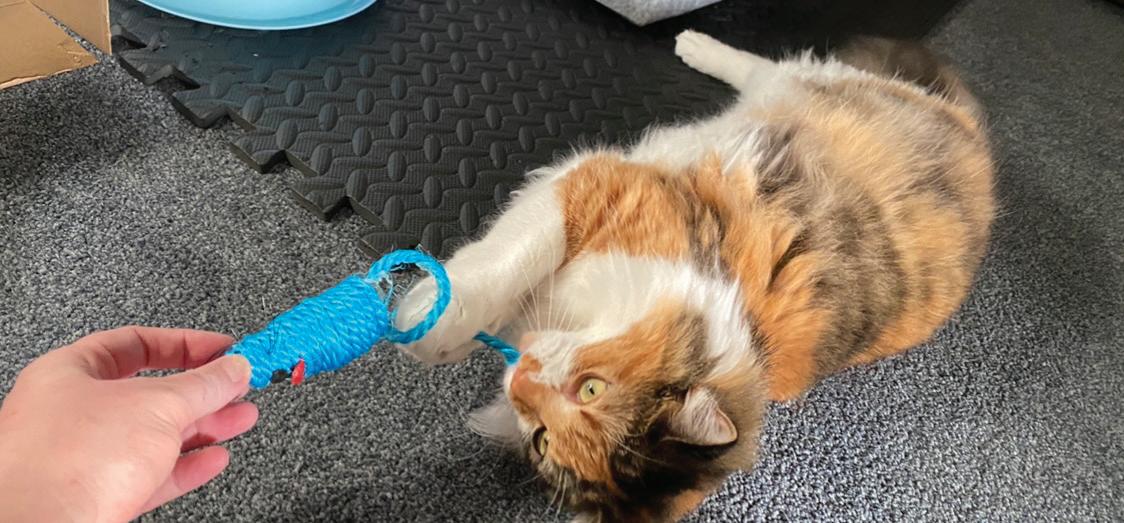
3 minute read
Let’s talk about insurance…
An important part of running any business is having the right insurance cover in place, and that’s no different when it comes to pet grooming businesses. In this feature, Petcover Group’s Lorraine Nash has teamed up with Dr Sophie Bell to delve into the topic of business insurance for pet professionals.
Sophie says:
I have been privileged over the past seven years to combine my skills as both a vet and a dog groomer to help educate pet owners and pet professionals, on canine and feline health and first aid. The dog and cat groomers especially have welcomed me with open arms and regularly contact me via my business, to help them answer questions they may have about the dogs and cats they are working with.
I am often asked about specific health problems in pets and how that may affect their groom, and I also receive a lot of questions involving potential insurance claims. It can be overwhelming when something happens within the salon which results in a pet needing veterinary care. As I always say, when working with animals and sharp tools; accidents can happen on occasion. That’s why it’s really important to make sure that you have a suitable pet business insurance policy in place, from a reliable provider and with adequate cover.
If you’re unsure about the insurance you currently have in place, and what it covers, please prioritise contacting your insurer to discuss it, it’s really important to make sure that you have adequate cover. And if your renewal is due soon, definitely review your insurance needs and the current values, to reassure yourself that you have enough cover. Keep reading to find out more about the potential consequences of underinsuring, and you’ll understand why I say that…
A few other tips from me include that groomers should always ask about an animal’s health prior to a groom, including details of medications and supplements they are taking, and be sure to make a record. And then check in at every subsequent groom to see if there are any changes. Drugs such as steroids can increase the risk of a skin infection and potentially cause changes to the coat growth post-groom. Document everything you find during a groom and take pictures of any concerning lumps or bumps you spot.
This issue’s topic is ‘Underinsurance’
We’ve had questions relating to the topic of underinsurance. So, let’s look at a couple, to help explain what underinsurance is, and also consider the potential consequences.
Question: I haven’t reviewed the sums insured in my business insurance policy for several years, I just let the policy autorenew with the same cover levels each year.

Does this matter? Will my insurer still pay out for the full claim amount if the cost of repairs, replacement or rebuild are more than the sum insured?
Question: Do all business insurance policies automatically provide cover for loss of income if the business is unable to trade due to an unexpected, serious event such as a fire or flood?
Lorraine says:
This is a hot topic, particularly in light of the current cost-of-living crisis, and with increased prices for services and materials impacting a wide range of industries.
‘Underinsurance’ is the term used to describe a situation in which a policyholder does not have adequate cover for their needs. Basically, if a business needs to make a claim on its insurance, but the policy it has in place doesn’t cover the sum of the claim, it is underinsured.
Some policyholders may be blissfully unaware that they’re underinsured, whilst others may have knowingly given lower values when setting up the policy, viewing it as a way to reduce premiums and pay less for their insurance.
This might not sound like a big deal, but the reality is that being underinsured, whether unwittingly or deliberately, can have a devastating impact on a business if it suffers a significant loss and needs to claim. It puts the policyholder in the position that they will need to make up any financial shortfall themselves.
Underinsurance isn’t just about insufficient cover in terms of the sums insured. It can also refer to optional insurance sections that the business may need, but has not included in its policy, such as cover for business equipment, or business interruption.
If your ‘business as usual’ trading is affected by an unplanned event or disaster, such as a flood, fire or another










